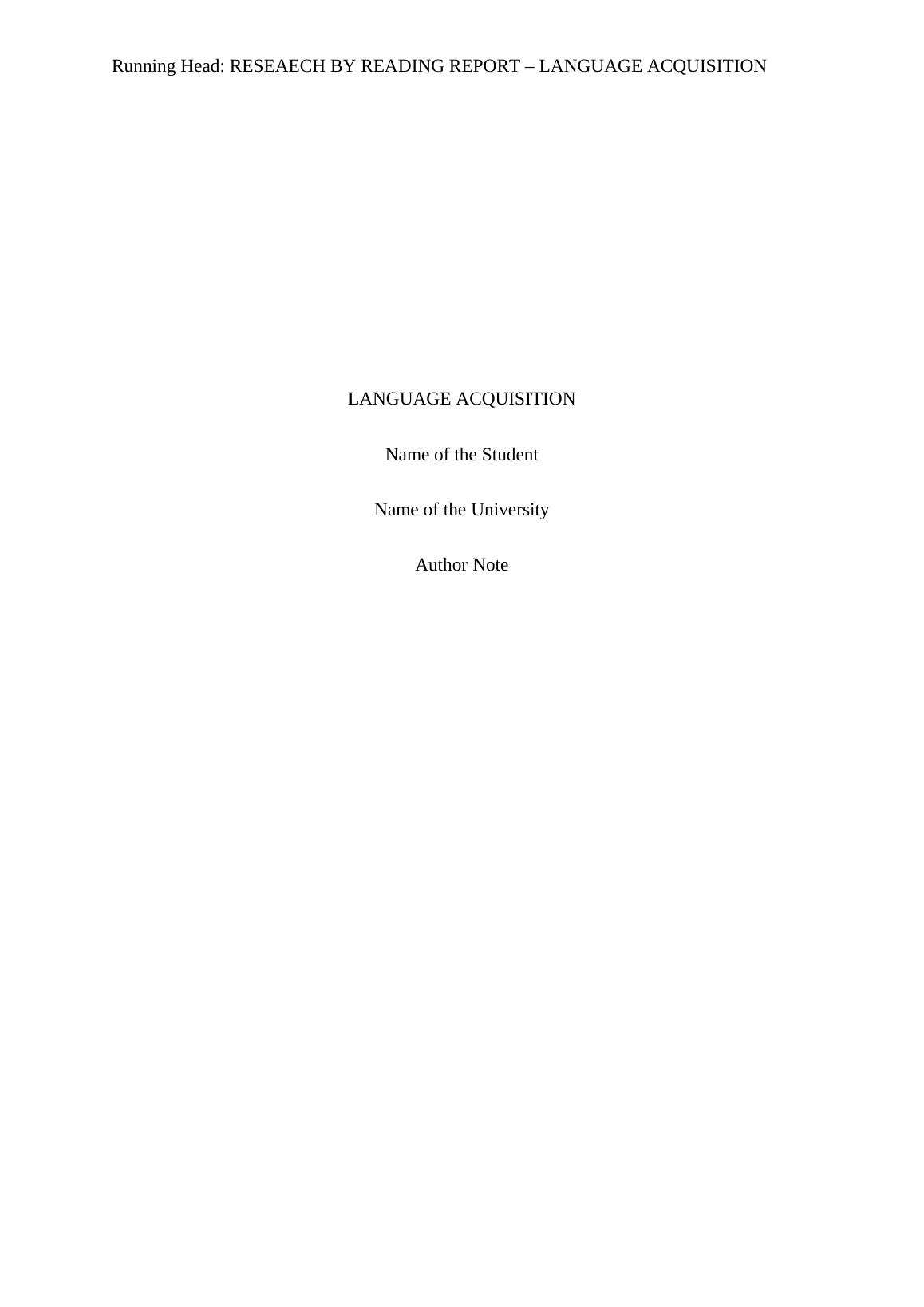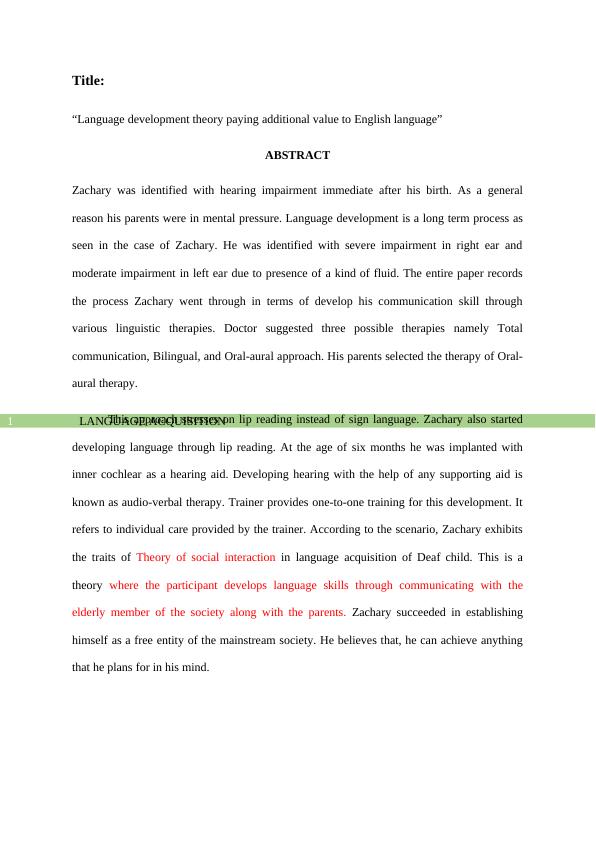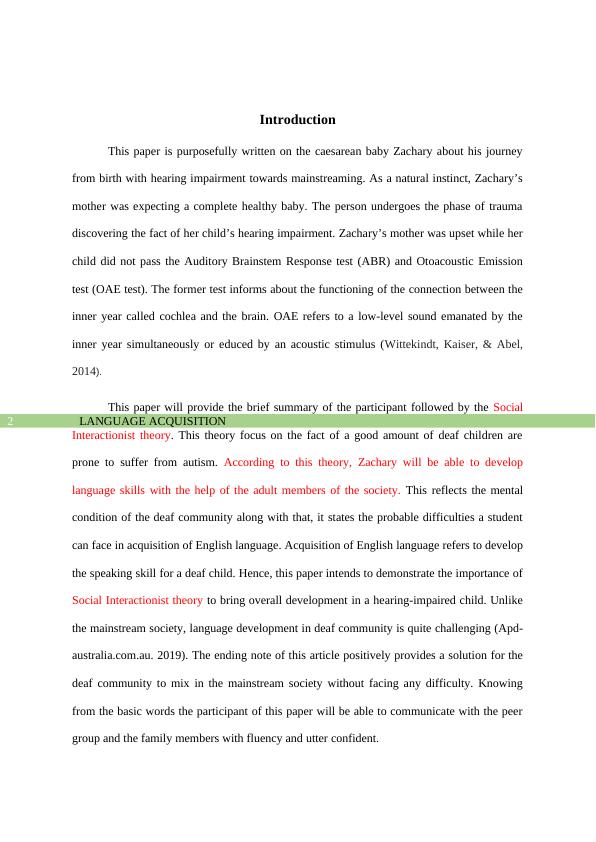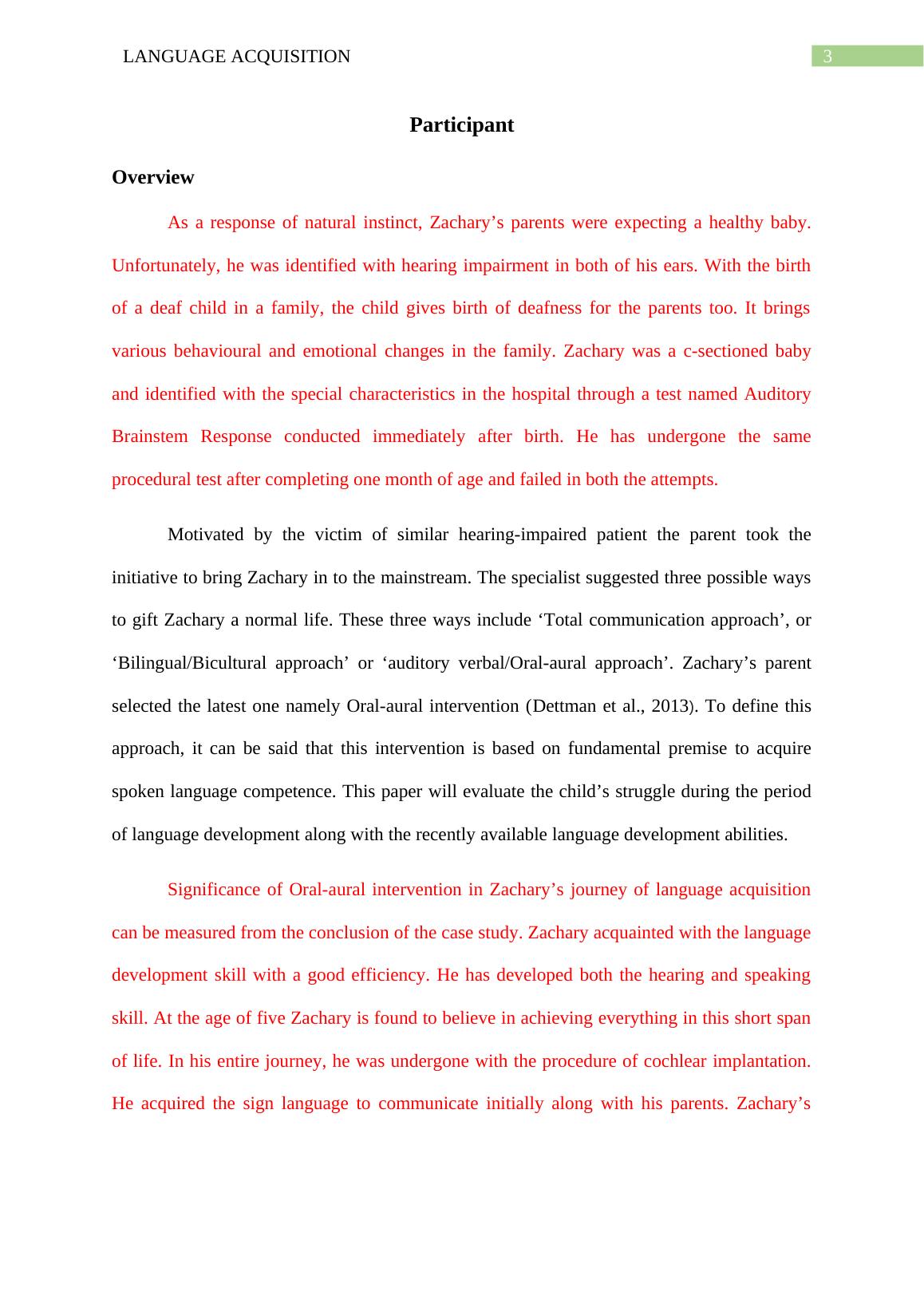Language Development Theory for English Language
Zachary, aged 5, was diagnosed with permanent hearing loss in both ears. This assignment requires a report on the causes, effects, and management of his condition.
13 Pages3537 Words2 Views
Added on 2022-12-30
About This Document
This paper discusses the language development theory and its importance in the acquisition of English language for hearing-impaired children. It focuses on the case study of Zachary, who underwent various linguistic therapies to develop his communication skills.
Language Development Theory for English Language
Zachary, aged 5, was diagnosed with permanent hearing loss in both ears. This assignment requires a report on the causes, effects, and management of his condition.
Added on 2022-12-30
ShareRelated Documents
Running Head: RESEAECH BY READING REPORT – LANGUAGE ACQUISITION
LANGUAGE ACQUISITION
Name of the Student
Name of the University
Author Note
LANGUAGE ACQUISITION
Name of the Student
Name of the University
Author Note

LANGUAGE ACQUISITION1
Title:
“Language development theory paying additional value to English language”
ABSTRACT
Zachary was identified with hearing impairment immediate after his birth. As a general
reason his parents were in mental pressure. Language development is a long term process as
seen in the case of Zachary. He was identified with severe impairment in right ear and
moderate impairment in left ear due to presence of a kind of fluid. The entire paper records
the process Zachary went through in terms of develop his communication skill through
various linguistic therapies. Doctor suggested three possible therapies namely Total
communication, Bilingual, and Oral-aural approach. His parents selected the therapy of Oral-
aural therapy.
This approach stresses on lip reading instead of sign language. Zachary also started
developing language through lip reading. At the age of six months he was implanted with
inner cochlear as a hearing aid. Developing hearing with the help of any supporting aid is
known as audio-verbal therapy. Trainer provides one-to-one training for this development. It
refers to individual care provided by the trainer. According to the scenario, Zachary exhibits
the traits of Theory of social interaction in language acquisition of Deaf child. This is a
theory where the participant develops language skills through communicating with the
elderly member of the society along with the parents. Zachary succeeded in establishing
himself as a free entity of the mainstream society. He believes that, he can achieve anything
that he plans for in his mind.
Title:
“Language development theory paying additional value to English language”
ABSTRACT
Zachary was identified with hearing impairment immediate after his birth. As a general
reason his parents were in mental pressure. Language development is a long term process as
seen in the case of Zachary. He was identified with severe impairment in right ear and
moderate impairment in left ear due to presence of a kind of fluid. The entire paper records
the process Zachary went through in terms of develop his communication skill through
various linguistic therapies. Doctor suggested three possible therapies namely Total
communication, Bilingual, and Oral-aural approach. His parents selected the therapy of Oral-
aural therapy.
This approach stresses on lip reading instead of sign language. Zachary also started
developing language through lip reading. At the age of six months he was implanted with
inner cochlear as a hearing aid. Developing hearing with the help of any supporting aid is
known as audio-verbal therapy. Trainer provides one-to-one training for this development. It
refers to individual care provided by the trainer. According to the scenario, Zachary exhibits
the traits of Theory of social interaction in language acquisition of Deaf child. This is a
theory where the participant develops language skills through communicating with the
elderly member of the society along with the parents. Zachary succeeded in establishing
himself as a free entity of the mainstream society. He believes that, he can achieve anything
that he plans for in his mind.

LANGUAGE ACQUISITION2
Introduction
This paper is purposefully written on the caesarean baby Zachary about his journey
from birth with hearing impairment towards mainstreaming. As a natural instinct, Zachary’s
mother was expecting a complete healthy baby. The person undergoes the phase of trauma
discovering the fact of her child’s hearing impairment. Zachary’s mother was upset while her
child did not pass the Auditory Brainstem Response test (ABR) and Otoacoustic Emission
test (OAE test). The former test informs about the functioning of the connection between the
inner year called cochlea and the brain. OAE refers to a low-level sound emanated by the
inner year simultaneously or educed by an acoustic stimulus (Wittekindt, Kaiser, & Abel,
2014).
This paper will provide the brief summary of the participant followed by the Social
Interactionist theory. This theory focus on the fact of a good amount of deaf children are
prone to suffer from autism. According to this theory, Zachary will be able to develop
language skills with the help of the adult members of the society. This reflects the mental
condition of the deaf community along with that, it states the probable difficulties a student
can face in acquisition of English language. Acquisition of English language refers to develop
the speaking skill for a deaf child. Hence, this paper intends to demonstrate the importance of
Social Interactionist theory to bring overall development in a hearing-impaired child. Unlike
the mainstream society, language development in deaf community is quite challenging (Apd-
australia.com.au. 2019). The ending note of this article positively provides a solution for the
deaf community to mix in the mainstream society without facing any difficulty. Knowing
from the basic words the participant of this paper will be able to communicate with the peer
group and the family members with fluency and utter confident.
Introduction
This paper is purposefully written on the caesarean baby Zachary about his journey
from birth with hearing impairment towards mainstreaming. As a natural instinct, Zachary’s
mother was expecting a complete healthy baby. The person undergoes the phase of trauma
discovering the fact of her child’s hearing impairment. Zachary’s mother was upset while her
child did not pass the Auditory Brainstem Response test (ABR) and Otoacoustic Emission
test (OAE test). The former test informs about the functioning of the connection between the
inner year called cochlea and the brain. OAE refers to a low-level sound emanated by the
inner year simultaneously or educed by an acoustic stimulus (Wittekindt, Kaiser, & Abel,
2014).
This paper will provide the brief summary of the participant followed by the Social
Interactionist theory. This theory focus on the fact of a good amount of deaf children are
prone to suffer from autism. According to this theory, Zachary will be able to develop
language skills with the help of the adult members of the society. This reflects the mental
condition of the deaf community along with that, it states the probable difficulties a student
can face in acquisition of English language. Acquisition of English language refers to develop
the speaking skill for a deaf child. Hence, this paper intends to demonstrate the importance of
Social Interactionist theory to bring overall development in a hearing-impaired child. Unlike
the mainstream society, language development in deaf community is quite challenging (Apd-
australia.com.au. 2019). The ending note of this article positively provides a solution for the
deaf community to mix in the mainstream society without facing any difficulty. Knowing
from the basic words the participant of this paper will be able to communicate with the peer
group and the family members with fluency and utter confident.

LANGUAGE ACQUISITION3
Participant
Overview
As a response of natural instinct, Zachary’s parents were expecting a healthy baby.
Unfortunately, he was identified with hearing impairment in both of his ears. With the birth
of a deaf child in a family, the child gives birth of deafness for the parents too. It brings
various behavioural and emotional changes in the family. Zachary was a c-sectioned baby
and identified with the special characteristics in the hospital through a test named Auditory
Brainstem Response conducted immediately after birth. He has undergone the same
procedural test after completing one month of age and failed in both the attempts.
Motivated by the victim of similar hearing-impaired patient the parent took the
initiative to bring Zachary in to the mainstream. The specialist suggested three possible ways
to gift Zachary a normal life. These three ways include ‘Total communication approach’, or
‘Bilingual/Bicultural approach’ or ‘auditory verbal/Oral-aural approach’. Zachary’s parent
selected the latest one namely Oral-aural intervention (Dettman et al., 2013). To define this
approach, it can be said that this intervention is based on fundamental premise to acquire
spoken language competence. This paper will evaluate the child’s struggle during the period
of language development along with the recently available language development abilities.
Significance of Oral-aural intervention in Zachary’s journey of language acquisition
can be measured from the conclusion of the case study. Zachary acquainted with the language
development skill with a good efficiency. He has developed both the hearing and speaking
skill. At the age of five Zachary is found to believe in achieving everything in this short span
of life. In his entire journey, he was undergone with the procedure of cochlear implantation.
He acquired the sign language to communicate initially along with his parents. Zachary’s
Participant
Overview
As a response of natural instinct, Zachary’s parents were expecting a healthy baby.
Unfortunately, he was identified with hearing impairment in both of his ears. With the birth
of a deaf child in a family, the child gives birth of deafness for the parents too. It brings
various behavioural and emotional changes in the family. Zachary was a c-sectioned baby
and identified with the special characteristics in the hospital through a test named Auditory
Brainstem Response conducted immediately after birth. He has undergone the same
procedural test after completing one month of age and failed in both the attempts.
Motivated by the victim of similar hearing-impaired patient the parent took the
initiative to bring Zachary in to the mainstream. The specialist suggested three possible ways
to gift Zachary a normal life. These three ways include ‘Total communication approach’, or
‘Bilingual/Bicultural approach’ or ‘auditory verbal/Oral-aural approach’. Zachary’s parent
selected the latest one namely Oral-aural intervention (Dettman et al., 2013). To define this
approach, it can be said that this intervention is based on fundamental premise to acquire
spoken language competence. This paper will evaluate the child’s struggle during the period
of language development along with the recently available language development abilities.
Significance of Oral-aural intervention in Zachary’s journey of language acquisition
can be measured from the conclusion of the case study. Zachary acquainted with the language
development skill with a good efficiency. He has developed both the hearing and speaking
skill. At the age of five Zachary is found to believe in achieving everything in this short span
of life. In his entire journey, he was undergone with the procedure of cochlear implantation.
He acquired the sign language to communicate initially along with his parents. Zachary’s

End of preview
Want to access all the pages? Upload your documents or become a member.
